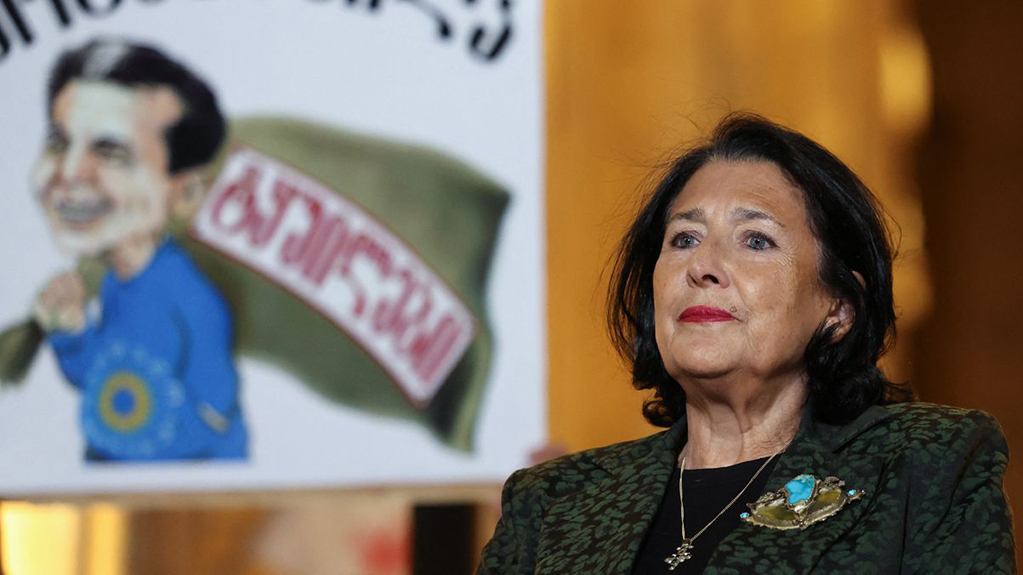"The Prosecutor's Office, it turns out, is waiting for me to provide evidence. I was under the impression it was the other way around - that it’s the investigative body's responsibility to gather evidence. This is how things work in any normal country," President Salome Zourabichvili remarked in response to being summoned to the Prosecutor's Office for questioning in the ongoing election-related investigation.
News
As Zourabichvili said, it is especially strange that the Prosecutor's Office initiated the investigation after an appeal from the Central Election Commission (CEC), now asking the President to submit evidence “based on the concerns” of the CEC.
“It turns out that the CEC is concerned. Its credibility is allegedly under attack. Why it should be discredited, I don’t know. These are the facts. Everyone knows the facts.
In general, the investigative body - the Prosecutor’s Office - should start an investigation when violations have occurred and are evident to all. Practically, citizens are involved in collecting this evidence - through observation missions, NGOs. A massive amount of material is already available.
The material gathered from individuals and organizations, which, it seems, wasn’t even reported to the Prosecutor’s Office, suggests that the October 26 election was marred by widespread, large-scale fraud, involving all known and unknown methods and forms of manipulation.
This was described by Josep Borrell. Voter bribery, intimidation, violence, ID card confiscation, carousel voting, and, most significantly, the recent discovery by the Georgian Young Lawyers' Association - the violation of ballot secrecy through the electronic system. GYLA submitted a notice about the flimsy papers before the elections, expecting the CEC to replace these papers, which they didn’t. Perhaps the CEC should have been also summoned. I don’t know. This is less of my business.
Furthermore, there are serious violations, with the most critical being the direct restriction of the diaspora's right to participate in elections. When we have more than a million emigrants, and polling stations were refused, it amounts to direct infringement on their rights and discrimination against our citizens.
I now turn to the Prosecutor's Office - you are accountable to the people. The public is demanding an immediate investigation, not my evidence.
No one currently expects the Prosecutor’s Office to start blatant proceedings against the President, which, I don’t even know how to categorize, strangely coincides with Medvedev’s ordered instructions. I don’t know who is following them or who isn’t.
Today, more than 1100 complaints have been submitted to the CEC, with a request to cancel the results from 246 precincts directly, presently affecting around 400 000 voters. So, it’s clear that this could have a significant impact on the election results themselves. And most importantly, there is now a question of systematic violations of ballot secrecy, which could ultimately call into question the validity of results from 2203 precincts.
I would therefore advise the Prosecutor’s Office to focus on its work and cease from settling political scores with the President. Our international partners are also watching to see if the Prosecutor's Office can act independently and impartially.
This only raises further questions, so let the Prosecutor’s Office do its job, and the President will do hers,” she said.
Salome Zourabichvili believes that there is psychological pressure being applied to society in order to “add tension, to stir up some fear amid the frustration.”
“I am grateful for all the messages of support I received today, saying, ‘Don’t be afraid.’ I am not afraid, and neither should you be,” said the President, who has no intention of going to the Prosecutor’s Office.
On October 29, the Central Election Commission stated that the President and opposition political parties’ allegations of “alleged election fraud” had reached a significant scale, “requiring a comprehensive and objective investigation.” The very next day, the Prosecutor’s Office opened a criminal case on election fraud and summoned the President for questioning. The General Prosecutor’s Office explained that Salome Zourabichvili “must have evidence regarding the possible falsification of the 2024 parliamentary elections.”















